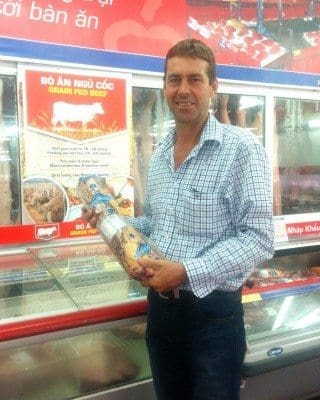AS Australian beef producers it is important to remember that animals in paddocks become meals in homes and restaurants all around the world.
We have an obligation to consumers, here and overseas, to provide assurances around how our cattle are raised, finished, processed and shipped.

CCA president Howard Smith with Australian grainfed beef in the Vietnamese market.
Australian beef producers take food safety issues very seriously. Each one of us must accept our responsibilities to produce our cattle ethically, respecting their welfare and the environment in which they are produced.
As President of the Cattle Council of Australia, I have had the opportunity to observe how important it is that, as a trade-exposed industry, we constantly improve our industry integrity systems and communicate these changes to consumers.
It’s from this that I know we can be proud of our reputation as a country that supplies safe and ethically produced beef to our consumers locally and in over 100 countries around the world.
This reputation hasn’t been won easily. It’s important to acknowledge the hard work of producers and industry in building and participating in programs that have established this reputation. As we have seen time and time again, in an international market as strong as beef, a reputation can be destroyed in an instant.
Some of the past initiatives that have been aimed at providing consumers with assurances around the safety and quality of Australian beef are now pillars of our global brand. At the time, no one could have fully appreciated how important these programs would become. The BTEC program and the prohibition of meat meal as a stockfeed are two of the initiatives that laid the groundwork for where we are today.
If we fail to maintain the standards the world has come to expect of us, we will find ourselves being outcompeted by the US, South America, India and other beef-producing countries, both in international markets and at home. As a predominant meat-exporting, trade-exposed country, we have to remain mindful that other beef supplying countries are ready and willing to replace us in our markets if we slip up.
It’s for these reasons I strongly support the upcoming changes to the Livestock Production Assurance program and understand their necessity.
The reality is the NVD, which continues to serve us well, needs to be enhanced in order to maintain our edge over other beef producing countries in markets around the world and communicate the high production standards widely adopted by our industry.
From 1 October 2017, industry’s new Integrity Systems Company will be introducing genuine improvements to our world-leading systems, through consolidating what we’ve developed over the years. The strengthening of industry integrity programs will require producers to pay a $60 (plus GST) recommitment fee when they renew accreditation, once every three years. This fee is to ensure that the LPA program can maintain and continually improve its communication, compliance and integrity functions.
While the existing paper-based NVD will continue to be available to LPA-accredited producers, an electronic NVD has been developed as an alternative for producers who are able to access online resources. The eNVD will offer a more streamlined method for its completion and it will be integrated with other important forms (like the Cattle Health Declaration for transferring animal-health information).
There will be an animal-welfare component to our LPA registration. This will require that we are familiar with the new animal-welfare standards, or laws, being brought in by each state/territory. These requirements are not onerous and will help ensure industry’s social licence is well defended.
Strong on-farm biosecurity practices, demonstrated through a biosecurity plan that includes managing feral animals, weeds and animal diseases, are fundamental to each of our businesses and vital to the whole of the beef supply chain.
Managing your properties’ risk is as much about ensuring your own financial security as it is about ensuring that of your neighbours. In such a tight-knit industry, none of us operate separate from each other, and the actions undertaken by the few can so often impact the many.
Ensuring our industry’s biosecurity is up to scratch allows producers to access the best markets for their beef and safeguards all of us into the future.
These changes are imperative to our industry, the community and our consumers, and it is imperative we undertake them together.
– Howard Smith, CCA President
